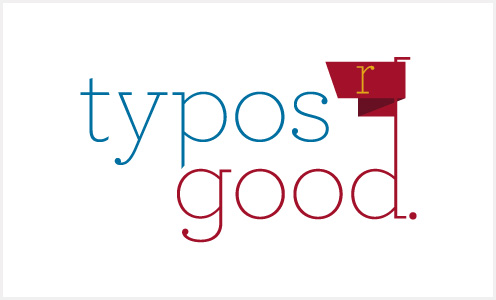Typos r Good

People in a hurry have to choose.
Choose a veneer of blamelessness. Or choose optimal progress.
It’s really that simple, and that difficult. Because people like to be blameless. They like to manage risk by trying to eliminate it. They want to appear all buttoned up, all the time. They don’t want be seen to fail, even in small ways on less important things.
But what if your choice is to risk failing on the small things versus a certainty of falling behind on the essential things?
My hero Abraham Lincoln was famous in his time for his rumpled clothes and crazy hair. He had a nation to save! He expressly believed in conceding less important things to achieve essential things.
Steve Jobs wore the same uniform every day. Black cotton polo shirt. Jeans. The Michael Jordan of meticulous choosing, he didn’t waste a minute deciding what to wear in the morning.
Our presentations have typos.
This is frankly divisive. Some people see a typo as a symbol of all that is unholy and shoddy in American enterprise, as a malodorous portent of some deep rot. In some cases, this is simply perfectionism rearing its fearful head. Some people are perfectionists. These people simple don’t belong in fast growing mid-market organizations, unless of course they are in accounting, collections, compliance, proofreading or production.
Others may be laboring under the drag of prejudices acquired in a pre-digital world. A newspaper published with a typo – as even the world’s-greatest newspaper, the New York Times, is every day — is irreparable. Billboards and brochures are expensive and embarrassing to fix. That’s why we employ professional proofreaders and have extensive processes for combing through documents throughout the production process. I’m knocking wood as I write this, but we haven’t had an error in a printed piece for well over a decade – a truly rare track record for any agency. But different levels of vigilance are appropriate to different media. A web post can be instantly updated. Timeliness might be the greater value. See the forest for the trees.
Personally, I hate a typo that affects my experience. If I’m in the middle of a story and my attention is suddenly drawn to a misspelling, the spell is broken (which is a neat little phrase with a nice confluence of meanings here). Elsewhere, not so much. So, not all typos are created equal. In early drafts, concept presentations, and throughout our process, short of pre-production, they are symbols that we’re putting first things first. First get the strategy right. Then get the concept right. Then get the plan right. Ultimately, get everything executed brilliantly and correctly.
Did Lincoln have pride in his work? He took pleasure from a successful outcome. He said on many occasions that he would save the Union any way he could – any way. There is no question he could be a meticulous craftsman. His law partner and great friend, Herndon, said that he could work for hours or days perfecting a single phrase. But not all of them. Not in those days, long before television and the Internet, when people expected four-hour speeches and seven-hour debates for their entertainment.
After he was President, it was different. He knew that everything he said could be used against him and his cause, so he avoided speaking extemporaneously, and he used two secretaries to write and proof and check.
Same guy, two different contexts. When Lincoln was a fast-growing visionary brand, he perfected the things that needed to be perfect, and he let the other things go. When he became CEO of a large, troubled enterprise, he reprioritized.
Do your priorities fit your situation and your ambitions? I like to see symbols that our priorities are in the right place.
So, when I see a well-placed typo, I smile. Those typos are good.

